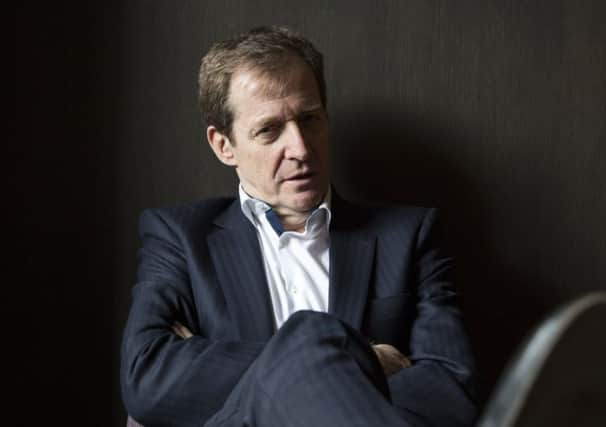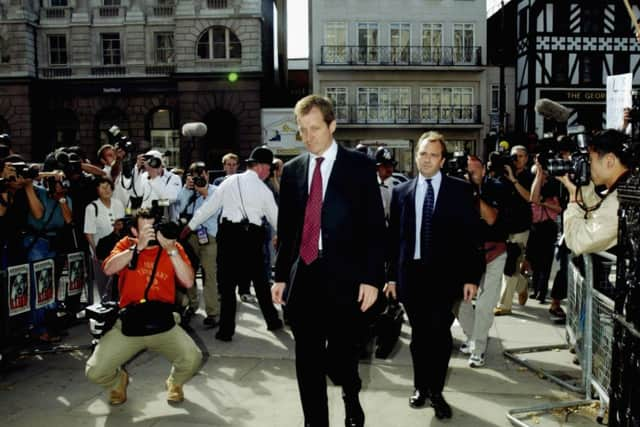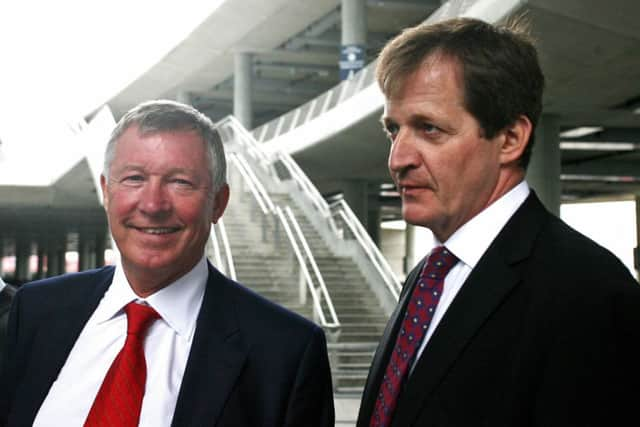Alastair Campbell on his obsession with winning


The former spin doctor has a heavy cold. Spluttering and coughing, on this frosty Glasgow morning Alastair Campbell is sniffing around more than Mourinho in the transfer window. Settling back into one of the cosy Harris Tweed-covered cinema seats in the Blythswood Square Hotel, he shudders a bit, and accepts a Lemsip. So, will Tony Blair’s former chief spokesman, the man who helped guide New Labour to two landslide election victories, the man who at the height of his No 10 career was likened to Goebbels, Hitler, Pol Pot and Rasputin, and who nowadays is billed as one of the country’s foremost experts on leadership, communication and strategy be depleted, be lost for words?
No chance. Campbell is a winner, an alpha male, and his fascination with success and how to achieve it is why he’s in Glasgow, plugging his latest (and 11th), chart-topping book, Winners And How They Succeed. As well as drawing on his own experience, he got up close and personal with the top talent across sport, politics, the media and business to get to the heart of winning. From Mandela to Merkel, Clinton to the Queen, Campbell has rubbed shoulders with those in power and his assessment of how they operate is backed up with conversations with the likes of Floyd Mayweather, Anna Wintour, Garry Kasparov and Richard Branson.
Advertisement
Hide AdAdvertisement
Hide AdBut with an election looming, Campbell is in demand to talk politics, especially in a post-referendum landscape where there is potential for a Labour/SNP coalition after the impending election.


“I don’t think a coalition will happen. I think it’s highly likely Labour can win a majority provided they focus on nothing but winning. It’s absurd to spend our time talking about what we’re going to do if we don’t win.
“You have to remember that the SNP, yes they are the government of a very important part of the UK, but ultimately their goal remains the same. It’s independence. So if you vote Labour, you’re voting for the union, you’re voting for a completely different approach to the management of the economy to the Conservative government, for a party that cares about the fact that inequality has grown, that can show through our record that we’re committed to proper investment in public services, that wants an engaged, active European policy, you’re voting to stay in the European Union. These are all big things, and you’re voting to get rid of the worst, most incompetent, rank, right-wing government we’ve had. They’re far worse than Thatcher.”
Campbell delivers his message with passion but is also charming and full of stories. He does impressions of Sir Alex Ferguson and Irish rugby union player Donncha O’Callaghan, and you feel you can ask him anything. However, that doesn’t mean he’ll answer. Did he write the book himself? “I did. And my son Rory wrote bits.” What about the rumours that Tony Blair is having an affair with Rupert Murdoch’s ex-wife. “I’m not going there. I believe Tony.” What will the Chilcot report tell us? “I said on the day I gave evidence I would not talk about it till the reports. I have stuck to that.” Why is he not married to Fiona Millar, his partner of almost 36 years, mother of Rory, Calum and Grace? “Because marriage is a religious thing and we’re not.”
Campbell himself is one of four children – there is Donald, 60, Graeme, 58, Alastair, 57 and Elizabeth, 55. The Campbell family home in Keighley, Yorkshire, then Leicester, was full of games and bickering.


“We played football, with the bottom of the piano the goal, and threw snooker balls and played cricket inside and out. There was a lot of sport in the house, and fighting, not more than most kids, but I’m afraid I was a bit of a sulker if I lost,” he says.
“And if Burnley [his football team] lost, it could take me days to get over it. My mum didn’t understand. She was one of those who would say life is about being content, happy with what you’ve got. She probably wouldn’t like the book,” he says.
“But I’ve never felt life is about the pursuit of happiness. I think it’s about the pursuit of progress and change.”
Advertisement
Hide AdAdvertisement
Hide AdEven when Labour won elections he didn’t appear to be happy.
“I wasn’t happy on the days, but I’m happy now that I was part of it. I was miserable a lot of the time, depressed a lot of the time, very stressed, angry a lot of the time because you were dealing with so much crap, both in the media and from politicians. But I’m happy to have been part of it and with the life it has helped me build.”
Is he still friends with Tony Blair?
“Very much so. I last saw him two or three weeks ago and speak to him regularly. I think he’s a great guy. I think it’s unfair the vilification that parts of the media did. I think he was our most successful leader. That silly woman in Dundee rejecting £1,000! I assume she doesn’t want to win,” he says, referring to Lesley Brennan.
Maybe she thought the money was tainted?
“I suspect it’s about getting publicity. It’s pathetic.”
Does the man who many believe was the inspiration for Peter Capaldi’s foul-mouthed, volcanic spin doctor Malcolm Tucker, miss being in the thick of it?
“I blow hot and cold on that. Sometimes I really miss it and think why are you wasting your life? It’s a dichotomy I live with every day, which is if you have a talent for something like strategy or communication or winning, why are you not putting that to the purpose of helping end this ridiculous, awful, terrible Tory government? I’ve turned down seats, the Lords, the chance to go back because something is holding me back. I’ve done my bit, paid the price in terms of family life and now I have a very different sort of life.” Why did he quit?
“I’d had enough, Fiona, the kids, my mum had had enough. My mum lost a stone and a half during the Hutton Inquiry and she was tiny anyway. I do things that I enjoy now, writing the book, working in Kosovo, Albania and Serbia, working for parties and governments, talks. I love that. And I get genuinely motivated when I’m doing the Time to Change mental health campaign stuff. I’ve done hundreds of talks on that now and it’s definitely changing, very slowly.”
He’s turned down the House of Lords, but would Campbell ever be an MP?
“I think I should be. But I don’t think I will. It’s back to that feeling of I’ve done my bit. David Ginola said I was being ridiculous, if you know you’re going to regret something, you should do it. But I think I would also regret it if I did do it. Even talking about it now, it’s making me feel suddenly tired.” He sighs.
I suggest it might be the comfy chair and the Lemsip.
Advertisement
Hide AdAdvertisement
Hide AdHe laughs. “No, it’s not. The thing is, when you’re doing politics at the top level alongside somebody like Tony Blair, doing it the way I did it, which is the only way I know how, it is utterly exhausting. And even though the kids are now in their twenties and doing fine, I don’t particularly want to put that at risk again.”
Since leaving government, Campbell has made a living as an author, broadcaster, motivational speaker and advisor to senior business figures, parties and governments. A journalist with the Daily Mirror and Today before joining Blair’s team in 1994, his writing includes journalism for GQ magazine, and books of his diaries, novels and a book on mental health. In his new book on winners, he stresses the importance of objectives, strategy and tactics, much of the analysis drawing parallels with the sporting world. Isn’t he comparing chalk and cheese?
“They are different but I think you can learn from sport. Teamwork for a start, and dealing with pressure. During my time in No 10 I benefited from discussions with Sir Alex Ferguson. He said a lot of things about rest and suggested a masseur on the campaign bus. I said I didn’t think so, imagine if the press had got hold of that!”
Would Campbell describe himself as a winner? “No. I think I’ve got a winning mind set because I’m very competitive and clear and I understand strategy more than most. I’ve been part of a winning team in New Labour. But I’ve also had losses and defeats and setbacks. I try to turn them into positives. You know, my breakdown, turning that into a positive. It’s about getting good out of bad.”
Campbell had a breakdown in 1986 and this was the catalyst for the campaign he feels most strongly about winning than any other. As he talks it becomes increasingly apparent he finds his most rewarding work to be that with Time to Change, which aims to end the stigma and discrimination experienced by people with mental health problems.
“The stigma,” he says, “is so infuriating. It’s funny, when I do talks, you cover politics, football, winning, strategy, and people come up at the end. Some want to row, about Iraq or tuition fees, some want a picture, some want a discussion and then there are The Whisperers. They lean in and whisper, thanks for what you do on depression. Thanks for what you do on mental health. And they whisper because they don’t want people to know what they’re talking about.”
The one time Campbell criticised Blair openly was when Blair described him in his book as crazy.
“I didn’t mind him saying that but it was just such a stereotype about the mentally ill. They’re either creative geniuses or they’re dangerous. It’s not true. Most mentally ill people are neither creative geniuses nor dangerous and most mentally ill people are far more likely to be victims of violence than violent.”
Advertisement
Hide AdAdvertisement
Hide AdCampbell’s own meltdown came in Hamilton council offices where he was accompanying Neil Kinnock and Harriet Harman to a dinner.
“This was one of the worst moments of my life. I was feeling isolated and scared and then a guy in a kilt walked by, carrying bagpipes. He had hair very similar to mine and I said to him, what is this all about? Why are they doing this to me? Then I said, is it about you? He must have thought I was f***ing insane. Ten minutes later two coppers arrive. Special Branch. They said, do you think you should come with us and I said, mmm, I probably should. Then it was into the car, into the station and I took all my clothes off and started banging my head on the wall, I was just f***ing away with the fairies by now.”
The police had found a friend of his, Brian Steel who worked at the Daily Star, who collected him from the station and took him to Ross Hall Hospital.
“We arrived there and I’m hearing the voices and all the rest of it, people having arguments in my head. As we walked in I said to him, Brian this is a f***ing private hospital. I’m not going into a private hospital. And Brian, how sharp is this, said no, it’s not. They pretend it’s private to make people think it’s better than it is. So I said OK.” He hoots at the memory.
“I was told it was a very severe psychotic breakdown. I would say it was brought on by alcohol and work. I think I was having withdrawal symptoms from emptying the minibar in my hotel room the day before. Self-medicating.”
What were you trying to block out?
“F*** knows.”
And it’s never happened again?
“I’ve had moments of flashback and fear that it might, but it’s never happened again. I take care to sleep and eat properly, and exercise.”
Campbell is still on anti-depressants after a dip last year and reckons he may always take them, having “found one that seems to work”. He sees a psychiatrist and is a big believer that politicians need psychological help every bit as much as sportsmen. When the relationship between Tony Blair and Gordon Brown was breaking down, it was Campbell who suggested to Blair that they get some kind of mediator in.
“It was like watching a marriage disintegrate and when that happens you get someone in to help. I was seeing a psychiatrist at the time for depression and I talked to him about it. I still dream quite a lot about the Tony/Gordon thing and I tell my psychiatrist my dreams because he psycho-analyses them. So at the time I’d said to him, what the hell can I do about this? He said in his view, it had probably gone too deep.”
Advertisement
Hide AdAdvertisement
Hide AdThat must be a big gig, being Alastair Campbell’s psychiatrist.
He laughs. “Well, yes. He’s a great guy.”
Or given his breakdown, former alcoholism and the punishing schedule, it can’t always have been a barrel of laughs being Campbell’s partner either. Why did Millar stay with him, especially at the time he was battling alcoholism?
“I’ve no idea. Look, we have a deep love for each other, and a deep bond, which I guess does get deeper with time. She’s an incredibly loyal person and wouldn’t have wanted to dump me when I was so vulnerable. But [he blows out a juddering breath like a racehorse]... pretty amazing really. And the truth is, even though I’m probably easier to live with than I was, I’m still not easy. A lot of people who have read the diaries would say it’s incredible we are still together.”
It’s especially incredible given that he plays the bagpipes in the bathroom “because the acoustics are better,” although he says Millar, the dog and the neighbours are all fans.
Campbell was taught the pipes by his father Donald, who hailed from Tiree. A Gaelic speaker who didn’t learn English until he went to school, he trained to be a vet in Glasgow, married an Ayrshire girl and the pair settled in Yorkshire.
Campbell still has lots of family in Scotland, as does his wife, whose father is originally from Paisley, and he says they’d love to live here.
“At school my brothers and I were all called Jock. Donald and I both played the bagpipes and I remember when I was growing up my dad tried to teach me Gaelic.”
Which brings us back to Scottish politics. How did Clan Campbell lean in the referendum?
Advertisement
Hide AdAdvertisement
Hide Ad“Of the ones who live in Scotland, I think some of my cousins may have voted Yes.”
Did they not tell him?
“Yes, they did. I would say, 55 per cent of my family here were No.”
If he moves here, he might get to vote on it himself in the future.
“Yeah. Listen, identity is a complicated issue. If someone ever says ah, you’re English, I will say, no I’m British and I’m Scottish, because that’s how I feel. I know I was born, raised and have spent most of my adult life in England, but I have never, ever, felt English. I don’t know what it is, but I have always felt Scottish.”
• Winners And How They Succeed, published by Random House and priced £20 is out now.
Thanks to Blythswood Square Hotel, 11 Blythswood Square Glasgow G2 4AD (0141-248 8888, www.townhousecompany.com/blythswoodsquare)
FOLLOW US
SCOTSMAN TABLET AND MOBILE APPS